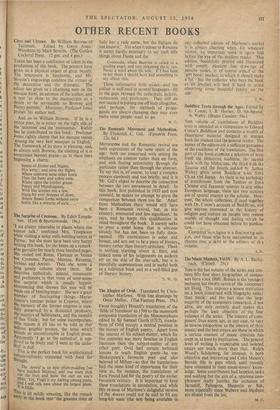METHODISM and the Romantic revival are both expressions of the
same spirit of the age: both are concerned with setting the emphasis on content rather than on form, and with finding universality through the particular rather than through the abstract. To say this is, of course, to treat a complex process carelessly and too briefly, and it is Mr. Gill's object to describe the connection between the two movements in detail. In this book, first published in 1937 and now reissued, he makes no attempt to press the comparison between them too far. 'Apart from Methodism there would still have been a Romantic revival, but, in this country, attenuated and less significant,' he says, and he keeps this qualification in mind throughout the book. It merely seeks to press a point home that is obvious already but has not been so fully docu- mented. Hi's examination is sober and honest, and sets out to be a piece of literary, history rather than literary criticism. There is nothing startling about it, then, and indeed some of his judgements on authors err on the side of the over-safe, but it is mercifully unpretentious and is useful both as a reference book and as a well-filled gap of literary history.
T. W. O.


































 Previous page
Previous page